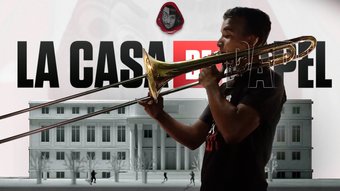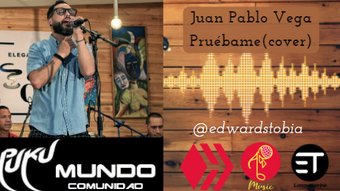Hive Open Mic Week #89 - Halelujah- For Trombone 🎺@Jorge234nv 🎧
10
About :
Hallelujah
Feliz y bendecida semana del Open mic. Espero que cada musico en esta comunidad la este pasando super bien!, Ya se acerca noche buena, hay que aprovechar lo que queda de año para disfrutar de esta hermosa vida. Les deseo lo mejor.
Happy and blessed Open mic week. I hope that every musician in this community is having a great time, and it's getting close to Christmas Eve, let's take advantage of what's left of the year to enjoy this beautiful life. I wish you all the best.
Hallelujah
es una canción de Leonard Cohen publicada en su álbum Various Positions en 1984. Inicialmente, no obtuvo mayor reconocimiento. En 1991, fue versionada por el músico galés John Cale, y obtuvo una buena aceptación. En 1994, el cantautor estadounidense Jeff Buckley grabó la versión que resultó más aclamada, lo cual popularizó la canción, y logró que desde ahí fuese versionada por numerosos artistas
Hallelujah
is a song by Leonard Cohen released on his 1984 album Various Positions. Initially, it did not gain much recognition. In 1991, it was covered by Welsh musician John Cale, and was well received. In 1994, the American singer-songwriter Jeff Buckley recorded the most acclaimed version, which popularized the song, and since then it has been covered by numerous artists.
Hallelujah - Aleluya
Es una palabra de origen hebreo que significa “alabado sea Dios”. Con respecto a la etimología, podemos dividir la palabra en dos partes: “hallelu” (alabanza) y “jah”, una forma abreviada de “Yahweh” – uno de los nombres de Dios que significa: El Que Es.
Hallelujah leonard cohen
Es una canción sobre la fe y la espiritualidad, con profundas cuestiones sobre el pensamiento religioso. Narrada en primera persona, la composición está dirigida a un destinatario [Dios] al que se cuestiona todo el tiempo. El narrador demuestra ser un sacerdote, pero su fe parece quebrantada.
En cuatro estrofas, la letra de la canción está cargada de referencias bíblicas. A lo largo de los versículos, Cohen utiliza extractos de los “Salmos de David”, con fragmentos del libro “Jueces” y cita uno de los “10 mandamientos” que, según las tradiciones de la religión hebrea, Dios Le entregó a Moisés.
Hallelujah - Allelujah
It is a word of Hebrew origin that means "praise God". Regarding the etymology, we can divide the word into two parts: "hallelu" (praise) and "jah", a shortened form of "Yahweh" - one of God's names meaning: He Who Is.
Hallelujah leonard cohen
It is a song about faith and spirituality, with profound questions about religious thought. Narrated in the first person, the composition is addressed to an addressee [God] who is questioned all the time. The narrator proves to be a priest, but his faith seems broken.
In four verses, the song's lyrics are loaded with biblical references. Throughout the verses, Cohen uses excerpts from the "Psalms of David", with fragments from the book "Judges" and quotes one of the "10 commandments" that, according to the traditions of the Hebrew religion, God gave to Moses.
En esta pagina podemos encontrar un poco mas acerca de el significado de cada estrofa, aqui abajo dejo en link de la pagina, y tambien os cuento un poco sobre lo que menciona.
https://www.cifraclub.com/blog/significado-de-hallelujah/
In this page we can find a little more about the meaning of each stanza, here below I leave the link to the page, and I also tell you a little about what it mentions.
https://www.cifraclub.com/blog/significado-de-hallelujah/
Primera estrofa – Oh, rey David
(Escuché que había un acorde secreto
Que David tocaba y complacía al Señor
Pero en realidad no te importa la música, ¿verdad?
Es algo como esto: la cuarta, la quinta,
las escalas descendientes menores suben en tono mayor,
y el rey desconcertado compone un Hallelujah.)
Tenemos en el primer verso una clara referencia a los “Salmos de David” y también a la música misma. Como dijimos anteriormente, “Hallelujah” es una forma de comenzar o terminar los salmos de David. La “cuarta” y la “quinta”, la “menor” y la “mayor”, son referencias de la escala musical que construyen la melodía de la canción, incluida la parte del estribillo.
First Stanza - Oh, King David
(I heard there was a secret chord
That David played and pleased the Lord.
But you don't really care about the music, do you?
It goes something like this: the fourth, the fifth,
the descending minor scales go up in a major key,
and the bewildered king composes a Hallelujah.)
We have in the first verse a clear reference to the "Psalms of David" and also to the music itself. As we said earlier, "Hallelujah" is a way of beginning or ending the Psalms of David. The "fourth" and the "fifth", the "minor" and the "major", are references to the musical scale that build the melody of the song, including the refrain part.
Segunda estrofa – Traiciones
(Tu fe era fuerte, pero necesitabas pruebas
La viste bañándose en la terraza
Su belleza y la luz de la luna te arruinaron
Te ató a la silla de la cocina
Destruyó tu trono y te cortó el pelo
Y en tus labios dibujó un Hallelujah.)
La estrofa comienza citando el episodio bíblico en el que el rey David, al ver a una mujer bañándose, se enamora de su belleza y comete adulterio con ella, lo que desagrada a los ojos del Señor.
En la secuencia, hay una referencia al caso de traición que involucra a Sansón y Dalila. Sansón fue un juez de Israel a quien Dios le otorgó una fuerza sobrehumana (¿alguien más se acordó de Hércules y Superman?) Le fue conferida por el Espíritu Santo para proteger a su pueblo de los ataques de los filisteos. Se casó con Dalila, una filistea de inusual belleza. En un momento de la historia, le corta el pelo a Sansón, que era la fuente de su fuerza y le entrega a su marido a sus enemigos.
En el último verso, el uso del término “Hallelujah” nos hace entender que Dalila tenía a Sansón en la palma de su mano. Fascinado por los encantos de su esposa, simplemente alaba a Dios por su traición.
Second Stanza - Betrayals
(Your faith was strong, but you needed proof
You saw her bathing on the terrace
Her beauty and the moonlight ruined you
She tied you to the kitchen chair
She destroyed your throne and cut off your hair
And on your lips she drew a Hallelujah).
The stanza begins by quoting the biblical episode in which King David, upon seeing a woman bathing, falls in love with her beauty and commits adultery with her, which displeases the eyes of the Lord.
In the sequence, there is a reference to the case of treason involving Samson and Delilah. Samson was a judge of Israel who was granted superhuman strength by God (anyone else remember Hercules and Superman?) It was bestowed upon him by the Holy Spirit to protect his people from the attacks of the Philistines. He married Delilah, a Philistine of unusual beauty. At one point in the story, she cuts Samson's hair, which was the source of his strength, and hands her husband over to her enemies.
In the last verse, the use of the term "Hallelujah" makes us understand that Delilah held Samson in the palm of her hand. Fascinated by his wife's charms, he simply praises God for his treachery.
Tercera estrofa – Cohen, el cuestionador
(Dijiste que usé el nombre en vano
Pero ni siquiera sé cuál es el nombre
Después de todo, ¿qué significa eso para ti?
Hay un rayo de luz en cada palabra
Y no importa cuál escuchaste
El sagrado Hallelujah o la partida.)
La tercera estrofa hace referencia al tercer mandamiento: “No tomarás el nombre del Señor tu Dios en vano, porque el Señor no dejará sin castigo a quien tome su nombre en vano”.
Third stanza - Cohen, the questioner
(You said I used the name in vain
But I don't even know what the name is
After all, what does that mean to you?
There's a ray of light in every word
And no matter which one you heard
The sacred Hallelujah or the parting).
The third stanza refers to the third commandment, "You shall not take the name of the Lord your God in vain, for the Lord will not leave unpunished anyone who takes his name in vain."
Cuarta estrofa: arrepentimiento y reflexiones
(Hice lo mejor que pude, pero no fue suficiente
No podía sentirlo, así que traté de tocar
Te había dicho la verdad, no vine aquí para engañarte
Y aunque todo salió mal
Me postraré ante la música del Señor
Sin nada en mi boca más que un Hallelujah)
Buscando su redención, Cohen mantiene la confesión de sus faltas hasta el último verso. Se reconoce a sí mismo como un hombre insensible y cuestiona su propia fe. Posteriormente, el compositor se redime con la revelación de su honestidad y finaliza la conversación postrándose ante la alabanza de Dios.
Fourth stanza: regret and reflections
(I did the best I could, but it wasn't enough.
I couldn't feel it, so I tried to play
I had told you the truth, I didn't come here to deceive you
And though it all went wrong
I'll bow down to the music of the Lord
With nothing in my mouth but a Hallelujah)
Seeking his redemption, Cohen maintains the confession of his faults until the last verse. He recognizes himself as an insensitive man and questions his own faith. Subsequently, the composer redeems himself with the revelation of his honesty and ends the conversation by prostrating himself before the praise of God.
Toda esta informacion ha sido sacada de esta pagina https://www.cifraclub.com/blog/significado-de-hallelujah/ te invito a leer un poco mas.
All this information has been taken from this page https://www.cifraclub.com/blog/significado-de-hallelujah/ I invite you to read a little more.
Original Music.
Artista: Leonard Cohen
Álbum: Various Positions
Fecha de lanzamiento: 1984
Amigos mios espero que mi pequeña interpretacion sea de su agrado, Un enorme abrazo. Dios los bendiga!!!!
My friends I hope that my little interpretation is to your liking. God bless you !!!!
Tags :
Their limit for today is $0!



























Comments:
Reply:
To comment on this video please connect a HIVE account to your profile: Connect HIVE Account